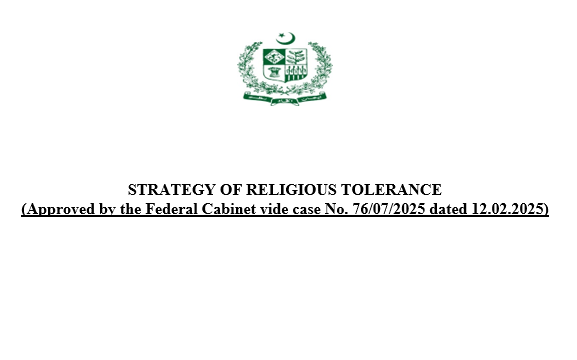
Religious tolerance is the acceptance and respect for the diversity of religious beliefs and practices within a society. It is a fundamental principle for fostering peace, social cohesion, and mutual understanding in a world where religious diversity is increasingly prevalent. In a country like Pakistan, where multiple religious communities coexist, promoting religious tolerance is not just a moral imperative but also a necessity for national unity and stability. This article outlines a comprehensive strategy for promoting religious tolerance, focusing on education, legal reforms, community engagement, media, and conflict resolution.
The Importance of Religious Tolerance
Religious tolerance is crucial for several reasons:
- Social Cohesion: A society that embraces religious tolerance is more likely to be stable and harmonious. It reduces the risk of social fragmentation and conflict, fostering a sense of unity and shared purpose.
- National Unity: In a multi-religious country, religious tolerance is essential for national unity. It helps to bridge divides and create a sense of belonging among all citizens, regardless of their religious beliefs.
- Global Peace: Religious tolerance contributes to global peace by reducing the likelihood of religiously motivated conflicts and promoting understanding and cooperation among different religious communities.
- Human Rights: Respect for religious diversity is a fundamental human right. Promoting religious tolerance ensures that all individuals can practice their religion freely and without fear of discrimination or persecution.
Principles of Religious Tolerance
The strategy for promoting religious tolerance is based on the following principles:
- Respect for Diversity: Recognizing and respecting the diversity of religious beliefs and practices is the foundation of religious tolerance. This principle emphasizes the importance of valuing differences rather than seeing them as a source of division.
- Mutual Understanding: Promoting mutual understanding among different religious communities is essential. This involves educating people about different religions, their beliefs, and practices, and fostering dialogue to dispel misconceptions and stereotypes.
- Non-Discrimination: Ensuring that all individuals, regardless of their religious beliefs, are treated equally under the law and in society. This principle is crucial for creating an inclusive environment where everyone feels valued and respected.
- Peaceful Coexistence: Encouraging peaceful coexistence among different religious communities by promoting tolerance, empathy, and cooperation. This principle emphasizes the importance of resolving conflicts through dialogue and non-violent means.
- Freedom of Religion: Upholding the right of individuals to practice their religion freely and without fear of persecution. This principle is enshrined in international human rights law and is a cornerstone of religious tolerance.

Strategies for Promoting Religious Tolerance
To achieve the goals of religious tolerance, the following strategies are proposed:
Education and Awareness
- Curriculum Development: Integrate religious education into school curricula to teach students about different religions, their beliefs, and practices. This will help to foster mutual understanding and respect from a young age.
- Public Awareness Campaigns: Launch public awareness campaigns to promote the values of religious tolerance. These campaigns can include media outreach, community events, and educational materials that highlight the importance of religious tolerance and coexistence.
- Interfaith Dialogues: Organize interfaith dialogues and forums where religious leaders, scholars, and community members can come together to discuss issues of common concern, share their perspectives, and build mutual understanding.
Legal and Policy Reforms
- Anti-Discrimination Laws: Strengthen anti-discrimination laws to protect individuals from religious discrimination in all areas of life, including employment, education, and access to public services.
- Hate Speech Legislation: Enforce laws against hate speech and incitement to religious violence. This includes monitoring and taking action against individuals and groups that spread religious hatred or incite violence against religious communities.
- Religious Freedom: Ensure that the right to freedom of religion is protected and upheld. This includes allowing individuals to practice their religion freely, build places of worship, and observe religious holidays without fear of persecution.
Community Engagement
- Interfaith Councils: Establish interfaith councils at the local, regional, and national levels to promote dialogue and cooperation among different religious communities. These councils can serve as platforms for addressing issues of concern and developing joint initiatives to promote religious tolerance.
- Community Programs: Develop community programs that bring together people of different faiths to work on common projects, such as community service, environmental conservation, and social welfare. These programs can help to build trust and foster a sense of shared purpose.
- Religious Festivals: Encourage the celebration of religious festivals of different communities in a spirit of inclusivity and mutual respect. This can help to promote understanding and appreciation of different religious traditions.
Media and Communication
- Responsible Reporting: Encourage the media to report on religious issues responsibly and avoid sensationalism that can fuel religious tensions. This includes providing accurate and balanced coverage of religious events and issues.
- Social Media Campaigns: Utilize social media platforms to promote messages of religious tolerance and counter hate speech and misinformation. Social media can be a powerful tool for reaching a wide audience and promoting positive narratives.
- Interfaith Media Programs: Develop media programs that showcase stories of interfaith cooperation and tolerance. These programs can include documentaries, talk shows, and interviews with religious leaders and community members who are working to promote religious understanding.
Conflict Resolution and Peacebuilding
- Mediation and Dialogue: Establish mechanisms for mediation and dialogue to resolve conflicts between religious communities. This can involve training community leaders in conflict resolution techniques and providing platforms for dialogue and negotiation.
- Peace Education: Integrate peace education into school curricula and community programs to teach individuals the skills needed to resolve conflicts peacefully and promote religious tolerance.
- Support for Victims: Provide support for victims of religious violence, including counseling, legal assistance, and financial aid. This can help to address the trauma and suffering caused by religious conflicts and promote healing and reconciliation.
Implementation and Monitoring
To ensure the effective implementation of the strategy for promoting religious tolerance, the following steps are recommended:
- National Religious Tolerance Commission: Establish a National Religious Tolerance Commission to oversee the implementation of the strategy and coordinate efforts at the national, regional, and local levels. The commission should include representatives from different religious communities, government agencies, and civil society organizations.
- Action Plans: Develop action plans at the national, regional, and local levels to outline specific steps and initiatives for promoting religious tolerance. These plans should include clear objectives, timelines, and indicators for measuring progress.
- Monitoring and Evaluation: Establish a monitoring and evaluation framework to track the implementation of the strategy and assess its impact. This should include regular reporting on progress, challenges, and lessons learned.
- Capacity Building: Provide training and capacity-building programs for government officials, religious leaders, and community members to enhance their understanding of religious tolerance and equip them with the skills needed to promote it.
- Funding and Resources: Allocate adequate funding and resources to support the implementation of the strategy. This includes funding for education and awareness campaigns, community programs, and conflict resolution initiatives.
Conclusion
Religious tolerance is essential for building a peaceful, inclusive, and prosperous society. The strategy outlined in this article provides a comprehensive framework for promoting religious tolerance through education, legal reforms, community engagement, media and communication, and conflict resolution. By implementing this strategy, we can create a society where people of different religious beliefs live together in mutual respect and understanding, contributing to national unity and global peace. The journey towards religious tolerance requires the collective efforts of government, religious leaders, civil society, and individuals. Together, we can build a future where diversity is celebrated, and religious differences are a source of strength rather than division.
;More Travel News
-
 05-Jul-2023Embrace the Serenity of Sun Tourism - Exploring Warm and Sunny Mountain Areas
05-Jul-2023Embrace the Serenity of Sun Tourism - Exploring Warm and Sunny Mountain Areas -
 25-Jul-2023Saudi Arabia Introduces Instant e-Visa for International Travelers
25-Jul-2023Saudi Arabia Introduces Instant e-Visa for International Travelers -
 18-Oct-2019PIA Umrah Ticket Price 2019
18-Oct-2019PIA Umrah Ticket Price 2019 -
 26-Apr-2021Top 5 Most Powerful Passports In The World
26-Apr-2021Top 5 Most Powerful Passports In The World -
 06-Mar-2025Discover Pakistan Together: Cultural Family Tours
06-Mar-2025Discover Pakistan Together: Cultural Family Tours -
 13-Nov-2019How Many People Die In Saudi Arabia during Hajj and Umrah
13-Nov-2019How Many People Die In Saudi Arabia during Hajj and Umrah -
 03-May-2024UAE has banned new tourist visas for citizens of Pakistan, Ethiopia and Bangladesh.
03-May-2024UAE has banned new tourist visas for citizens of Pakistan, Ethiopia and Bangladesh. -
 18-Sep-2023These Countries Provide Easy Visas from Pakistan
18-Sep-2023These Countries Provide Easy Visas from Pakistan
